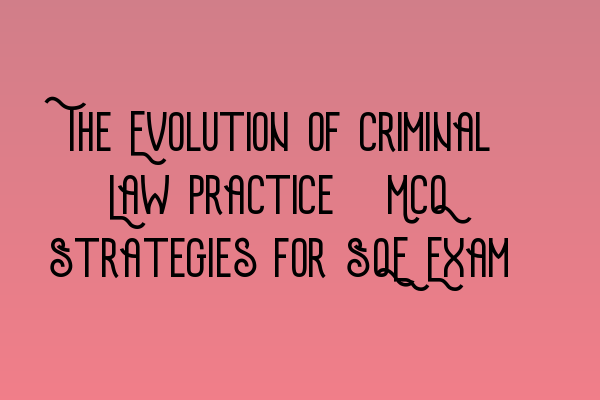The Evolution of Criminal Law Practice: MCQ Strategies for SQE Exam
Welcome to SQE Criminal Law & Practice Law UK, your trusted resource for all things related to the SQE Exam. In this blog post, we will delve into the evolution of criminal law practice and share some valuable MCQ (Multiple Choice Questions) strategies to help you ace the SQE Exam with confidence.
The Changing Landscape of Criminal Law Practice
Criminal law practice has undergone significant changes over the years. With the introduction of the Solicitors Qualifying Examination (SQE) in the UK, aspiring solicitors are now required to demonstrate their knowledge and skills through this standardized assessment. This shift aims to ensure that legal professionals are equipped with the necessary expertise to effectively serve their clients in the dynamic field of criminal law.
As the SQE Exam comprises multiple-choice questions, developing effective strategies to tackle these questions is crucial for success. Let’s explore some strategies that can enhance your performance in the exam.
MCQ Strategies for SQE Exam Success
1. Understand the Question Structure: The first step to success is understanding how MCQs are structured in the SQE Exam. Questions may have single or multiple correct answers, and it is essential to carefully analyze the question to identify the correct response.
2. Read Each Option Carefully: Take the time to read all the options before selecting an answer. Sometimes, there may be multiple plausible options, but one will be the most accurate or appropriate in the given context. Identify keywords in the question and look for similar keywords or phrases in the options.
3. Use the Process of Elimination: If you’re unsure about the correct answer, use the process of elimination. Start by eliminating options that are clearly incorrect. This technique increases your chances of selecting the correct response by narrowing down your choices.
4. Manage Your Time Effectively: Time management is key in any exam, and the SQE Exam is no exception. Allocate time for each question, and if you encounter a particularly challenging question, mark it and come back to it later. Prioritize easy questions first to build confidence and ensure you answer as many questions as possible within the given time.
5. Practice, Practice, Practice: One of the most effective ways to prepare for MCQ-based exams is through practice. SQE 1 Practice Exam Questions and SQE 1 Practice Mocks FLK1 FLK2 are valuable resources that provide ample opportunities to refine your skills and familiarize yourself with the exam format. By regularly practicing with these resources, you can improve your speed and accuracy in answering MCQs.
6. Seek Professional Guidance: SQE 2 Preparation Courses and SQE 1 Preparation Courses can greatly supplement your exam preparation. These courses are designed by legal experts who have in-depth knowledge of the SQE Exam and its requirements. Enrolling in these courses can provide you with invaluable insights, personalized guidance, and effective study materials.
7. Stay Updated on Exam Dates: Being aware of the SRA SQE Exam Dates is essential to plan your preparation effectively. Stay informed about registration deadlines and exam schedules to ensure you don’t miss any important dates and can plan your study routine accordingly.
By incorporating these strategies into your preparation, you can boost your performance in the SQE Exam and increase your chances of success.
At SQE Criminal Law & Practice Law UK, we are committed to helping aspiring solicitors excel in their SQE Exam. Explore our resources and courses to enhance your preparation and achieve your career goals.
Remember, success in the SQE Exam is not only about knowledge but also about strategic thinking and effective time management. Develop a well-rounded approach that combines comprehensive study with practical strategies, and you’ll be on your way to becoming a competent criminal law practitioner.
